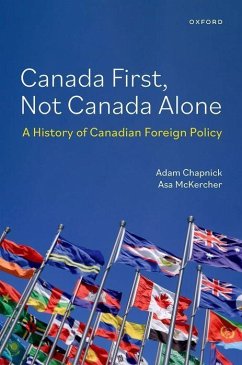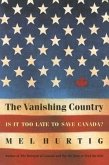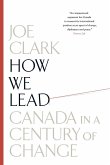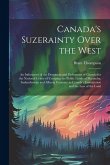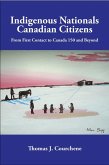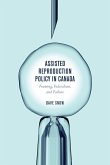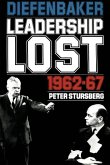- Broschiertes Buch
- Merkliste
- Auf die Merkliste
- Bewerten Bewerten
- Teilen
- Produkt teilen
- Produkterinnerung
- Produkterinnerung
The definitive history of Canadian foreign policy since the 1930s, Canada First, Not Canada Alone examines how successive prime ministers have promoted Canada's national interests in a world that has grown increasingly complex and interconnected. Case studies focused on environmental reform, Indigenous peoples, trade, hostage diplomacy, and wartime strategy illustrate the breadth of issues that shape Canada's global realm. Drawing from extensive primary and secondary research, Adam Chapnick and Asa McKercher offer a fresh take on how Canada positions itself in the world.
Andere Kunden interessierten sich auch für
![The Vanishing Country: Is It Too Late to Save Canada? The Vanishing Country: Is It Too Late to Save Canada?]() Mel HurtigThe Vanishing Country: Is It Too Late to Save Canada?18,99 €
Mel HurtigThe Vanishing Country: Is It Too Late to Save Canada?18,99 €![How We Lead How We Lead]() Joe ClarkHow We Lead21,99 €
Joe ClarkHow We Lead21,99 €![Fear, Love, and Liberation in Contemporary Quebec: A Feminist Reflection Fear, Love, and Liberation in Contemporary Quebec: A Feminist Reflection]() Alexa ConradiFear, Love, and Liberation in Contemporary Quebec: A Feminist Reflection17,99 €
Alexa ConradiFear, Love, and Liberation in Contemporary Quebec: A Feminist Reflection17,99 €![Canada's Suzerainty Over the West; an Indictment of the Dominion and Parliament of Canada for the National Crime of Usurping the Public Lands of Manit Canada's Suzerainty Over the West; an Indictment of the Dominion and Parliament of Canada for the National Crime of Usurping the Public Lands of Manit]() Bram ThompsonCanada's Suzerainty Over the West; an Indictment of the Dominion and Parliament of Canada for the National Crime of Usurping the Public Lands of Manit19,99 €
Bram ThompsonCanada's Suzerainty Over the West; an Indictment of the Dominion and Parliament of Canada for the National Crime of Usurping the Public Lands of Manit19,99 €![Indigenous Nationals, Canadian Citizens: From First Contact to Canada 150 and Beyond Volume 196 Indigenous Nationals, Canadian Citizens: From First Contact to Canada 150 and Beyond Volume 196]() Thomas J. CourcheneIndigenous Nationals, Canadian Citizens: From First Contact to Canada 150 and Beyond Volume 19653,99 €
Thomas J. CourcheneIndigenous Nationals, Canadian Citizens: From First Contact to Canada 150 and Beyond Volume 19653,99 €![Assisted Reproduction Policy in Canada Assisted Reproduction Policy in Canada]() Dave SnowAssisted Reproduction Policy in Canada48,99 €
Dave SnowAssisted Reproduction Policy in Canada48,99 €![Diefenbaker Diefenbaker]() Peter StursbergDiefenbaker31,99 €
Peter StursbergDiefenbaker31,99 €-
-
-
The definitive history of Canadian foreign policy since the 1930s, Canada First, Not Canada Alone examines how successive prime ministers have promoted Canada's national interests in a world that has grown increasingly complex and interconnected. Case studies focused on environmental reform, Indigenous peoples, trade, hostage diplomacy, and wartime strategy illustrate the breadth of issues that shape Canada's global realm. Drawing from extensive primary and secondary research, Adam Chapnick and Asa McKercher offer a fresh take on how Canada positions itself in the world.
Hinweis: Dieser Artikel kann nur an eine deutsche Lieferadresse ausgeliefert werden.
Hinweis: Dieser Artikel kann nur an eine deutsche Lieferadresse ausgeliefert werden.
Produktdetails
- Produktdetails
- Verlag: Oxford University Press
- Seitenzahl: 360
- Erscheinungstermin: 16. Oktober 2024
- Englisch
- Abmessung: 239mm x 155mm x 23mm
- Gewicht: 522g
- ISBN-13: 9780197653715
- ISBN-10: 0197653715
- Artikelnr.: 71235125
- Herstellerkennzeichnung
- Libri GmbH
- Europaallee 1
- 36244 Bad Hersfeld
- gpsr@libri.de
- Verlag: Oxford University Press
- Seitenzahl: 360
- Erscheinungstermin: 16. Oktober 2024
- Englisch
- Abmessung: 239mm x 155mm x 23mm
- Gewicht: 522g
- ISBN-13: 9780197653715
- ISBN-10: 0197653715
- Artikelnr.: 71235125
- Herstellerkennzeichnung
- Libri GmbH
- Europaallee 1
- 36244 Bad Hersfeld
- gpsr@libri.de
Adam Chapnick is Professor of Defence Studies at the Canadian Forces College and the Royal Military College of Canada (RMC). He is the award-winning author of Canada on the United Nations Security Council: A Small Power on a Large Stage, among other titles, and a former editor of International Journal. Asa McKercher is Steven K. Hudson Research Chair in Canada-US Relations and Associate Professor at St. Francis Xavier University. He is the author of include Canada and the World since 1867 (Bloomsbury, 2019) and Camelot and Canada: Canadian-American Relations in the Kennedy Era (OUP, 2016). He is the Editor-in-Chief of International Journal.
* Acknowledgments
* Introduction
* Chapter 1: Ideas and Antecedents
* Chapter 2: William Lyon Mackenzie King and the Evolution of Canada's
Global Posture, 1935-1948
* Case Studies: The Voyage of the MS St Louis, 1939
* The Hyde Park Declaration, 1941
* The Debate over Article 2 of the North Atlantic Treaty, 1947-1949
* Granting the Great Powers a Veto in the United Nations Organization,
1945
* Chapter 3: Louis St. Laurent and the Expansion of the Canadian
Foreign Policy Realm, 1948-1957
* Case Studies: The Launch of the Colombo Plan for Cooperative Economic
Development in
* South and Southeast Asia, 1950-1951
* The Establishment of the Distant Early Warning (DEW) Line, 1953-1957
* The Suez Crisis and the Hungarian Revolution, 1956
* Attending the 10th Inter-American Conference of the Organization of
American States (OAS) as
* an Observer, 1952-1954
* Chapter 4: John Diefenbaker and the Politics of Foreign Policy
Decision-making, 1957-1963
* Case Studies: The Establishment of the North American Air Defence
Command (NORAD), 1957-1958
* South Africa's Withdrawal from the Commonwealth, 1960-1961
* Negotiations to Acquire Nuclear Weapons, 1957-1963
* Responding to the White House's Decision to Move American NORAD
forces to
* Defence Condition (DEFCON) 3 without Consulting Ottawa during the
Cuban Missile Crisis,
* 1962
* Chapter 5: Lester B. Pearson and the Domestic Implications of
Canadian Foreign Policy, 1963-1968
* Case Studies: The Promulgation of the Gérin-Lajoie Doctrine, 1965
* Prime Minister Lester Pearson's Speech at Temple University, 1965
* Managing the Impact of Split-run Magazines in Canada, 1964-1965
* Chapter 6: Pierre Elliott Trudeau and the Re-imagination of "Canada
First," 1968-1984
* Case Studies: Reconsidering Canada's Military Role in NATO, 1968-1969
* The Voyages of the SS Manhattan through the Northwest Passage,
1968-1970
* Joe Clark's Proposal to Move the Canadian Embassy in Israel from Tel
Aviv to Jerusalem,
* 1979-1980
* The National Energy Program, 1980-1984
* Recognizing the People's Republic of China (PRC), 1968-1970
* Chapter 7: Brian Mulroney and the Transformation of Canadian
International Affairs, 1984-1993
* Case Studies: Responding to Famine in Ethiopia, 1984-1986
* The Origins of the Canada-United States Free Trade Agreement,
1983-1989
* Negotiating the Canada-United States Air Quality Agreement, 1991
* Responding to Iraq's Invasion of Kuwait, 1990-1991
* Chapter 8: Jean Chrétien, Frugality, and Boldness, 1993-2001
* Case Studies: The Turbot War, 1994-1995
* The International Campaign to Ban Anti-personnel Landmines, 1994-1997
* NATO's Military Intervention in Kosovo, 1998-1999
* Conflict Diamonds in Angola and UN Security Council Sanctions Reform,
1999-2000
* Chapter 9: Jean Chrétien, Paul Martin, and the Aftermath of 9/11,
2000-2006
* Case Studies: The Kyoto Protocol, 1997-2002
* Canada's Response to the American Decision to Invade Iraq, 2002-2003
* Deploying to Kandahar Province, 2003-2005
* Participating in the United States Ballistic Missile Defense Program,
2003-2006
* Chapter 10: Stephen Harper's Conservative Values on the World Stage,
2006-2015
* Case Studies: Affirming Support for the United Nations Declaration on
the Rights of Indigenous
* Peoples (UNDRIP), 2007-2010
* The Muskoka Initiative on Maternal, Newborn, and Child Health,
2009-2010
* Canada's Response to the Euromaidan, 2013-2015
* Creating the Department of Foreign Affairs, Trade, and Development,
2013
* Chapter 11: Justin Trudeau and an Increasingly Dangerous World, 2015-
* Case Studies: Selling Light Armoured Vehicles to Saudi Arabia,
2015-2019
* Renegotiating the North American Free Trade Agreement, 2017-2018
* China's Arbitrary Imprisonment of Michael Kovrig and Michael Spavor,
2018-2021
* Responding to a Dramatic Increase in Irregular Migration, 2017-2020
* Conclusion: Canada First in the Future
* Notes
* Index
* Introduction
* Chapter 1: Ideas and Antecedents
* Chapter 2: William Lyon Mackenzie King and the Evolution of Canada's
Global Posture, 1935-1948
* Case Studies: The Voyage of the MS St Louis, 1939
* The Hyde Park Declaration, 1941
* The Debate over Article 2 of the North Atlantic Treaty, 1947-1949
* Granting the Great Powers a Veto in the United Nations Organization,
1945
* Chapter 3: Louis St. Laurent and the Expansion of the Canadian
Foreign Policy Realm, 1948-1957
* Case Studies: The Launch of the Colombo Plan for Cooperative Economic
Development in
* South and Southeast Asia, 1950-1951
* The Establishment of the Distant Early Warning (DEW) Line, 1953-1957
* The Suez Crisis and the Hungarian Revolution, 1956
* Attending the 10th Inter-American Conference of the Organization of
American States (OAS) as
* an Observer, 1952-1954
* Chapter 4: John Diefenbaker and the Politics of Foreign Policy
Decision-making, 1957-1963
* Case Studies: The Establishment of the North American Air Defence
Command (NORAD), 1957-1958
* South Africa's Withdrawal from the Commonwealth, 1960-1961
* Negotiations to Acquire Nuclear Weapons, 1957-1963
* Responding to the White House's Decision to Move American NORAD
forces to
* Defence Condition (DEFCON) 3 without Consulting Ottawa during the
Cuban Missile Crisis,
* 1962
* Chapter 5: Lester B. Pearson and the Domestic Implications of
Canadian Foreign Policy, 1963-1968
* Case Studies: The Promulgation of the Gérin-Lajoie Doctrine, 1965
* Prime Minister Lester Pearson's Speech at Temple University, 1965
* Managing the Impact of Split-run Magazines in Canada, 1964-1965
* Chapter 6: Pierre Elliott Trudeau and the Re-imagination of "Canada
First," 1968-1984
* Case Studies: Reconsidering Canada's Military Role in NATO, 1968-1969
* The Voyages of the SS Manhattan through the Northwest Passage,
1968-1970
* Joe Clark's Proposal to Move the Canadian Embassy in Israel from Tel
Aviv to Jerusalem,
* 1979-1980
* The National Energy Program, 1980-1984
* Recognizing the People's Republic of China (PRC), 1968-1970
* Chapter 7: Brian Mulroney and the Transformation of Canadian
International Affairs, 1984-1993
* Case Studies: Responding to Famine in Ethiopia, 1984-1986
* The Origins of the Canada-United States Free Trade Agreement,
1983-1989
* Negotiating the Canada-United States Air Quality Agreement, 1991
* Responding to Iraq's Invasion of Kuwait, 1990-1991
* Chapter 8: Jean Chrétien, Frugality, and Boldness, 1993-2001
* Case Studies: The Turbot War, 1994-1995
* The International Campaign to Ban Anti-personnel Landmines, 1994-1997
* NATO's Military Intervention in Kosovo, 1998-1999
* Conflict Diamonds in Angola and UN Security Council Sanctions Reform,
1999-2000
* Chapter 9: Jean Chrétien, Paul Martin, and the Aftermath of 9/11,
2000-2006
* Case Studies: The Kyoto Protocol, 1997-2002
* Canada's Response to the American Decision to Invade Iraq, 2002-2003
* Deploying to Kandahar Province, 2003-2005
* Participating in the United States Ballistic Missile Defense Program,
2003-2006
* Chapter 10: Stephen Harper's Conservative Values on the World Stage,
2006-2015
* Case Studies: Affirming Support for the United Nations Declaration on
the Rights of Indigenous
* Peoples (UNDRIP), 2007-2010
* The Muskoka Initiative on Maternal, Newborn, and Child Health,
2009-2010
* Canada's Response to the Euromaidan, 2013-2015
* Creating the Department of Foreign Affairs, Trade, and Development,
2013
* Chapter 11: Justin Trudeau and an Increasingly Dangerous World, 2015-
* Case Studies: Selling Light Armoured Vehicles to Saudi Arabia,
2015-2019
* Renegotiating the North American Free Trade Agreement, 2017-2018
* China's Arbitrary Imprisonment of Michael Kovrig and Michael Spavor,
2018-2021
* Responding to a Dramatic Increase in Irregular Migration, 2017-2020
* Conclusion: Canada First in the Future
* Notes
* Index
* Acknowledgments
* Introduction
* Chapter 1: Ideas and Antecedents
* Chapter 2: William Lyon Mackenzie King and the Evolution of Canada's
Global Posture, 1935-1948
* Case Studies: The Voyage of the MS St Louis, 1939
* The Hyde Park Declaration, 1941
* The Debate over Article 2 of the North Atlantic Treaty, 1947-1949
* Granting the Great Powers a Veto in the United Nations Organization,
1945
* Chapter 3: Louis St. Laurent and the Expansion of the Canadian
Foreign Policy Realm, 1948-1957
* Case Studies: The Launch of the Colombo Plan for Cooperative Economic
Development in
* South and Southeast Asia, 1950-1951
* The Establishment of the Distant Early Warning (DEW) Line, 1953-1957
* The Suez Crisis and the Hungarian Revolution, 1956
* Attending the 10th Inter-American Conference of the Organization of
American States (OAS) as
* an Observer, 1952-1954
* Chapter 4: John Diefenbaker and the Politics of Foreign Policy
Decision-making, 1957-1963
* Case Studies: The Establishment of the North American Air Defence
Command (NORAD), 1957-1958
* South Africa's Withdrawal from the Commonwealth, 1960-1961
* Negotiations to Acquire Nuclear Weapons, 1957-1963
* Responding to the White House's Decision to Move American NORAD
forces to
* Defence Condition (DEFCON) 3 without Consulting Ottawa during the
Cuban Missile Crisis,
* 1962
* Chapter 5: Lester B. Pearson and the Domestic Implications of
Canadian Foreign Policy, 1963-1968
* Case Studies: The Promulgation of the Gérin-Lajoie Doctrine, 1965
* Prime Minister Lester Pearson's Speech at Temple University, 1965
* Managing the Impact of Split-run Magazines in Canada, 1964-1965
* Chapter 6: Pierre Elliott Trudeau and the Re-imagination of "Canada
First," 1968-1984
* Case Studies: Reconsidering Canada's Military Role in NATO, 1968-1969
* The Voyages of the SS Manhattan through the Northwest Passage,
1968-1970
* Joe Clark's Proposal to Move the Canadian Embassy in Israel from Tel
Aviv to Jerusalem,
* 1979-1980
* The National Energy Program, 1980-1984
* Recognizing the People's Republic of China (PRC), 1968-1970
* Chapter 7: Brian Mulroney and the Transformation of Canadian
International Affairs, 1984-1993
* Case Studies: Responding to Famine in Ethiopia, 1984-1986
* The Origins of the Canada-United States Free Trade Agreement,
1983-1989
* Negotiating the Canada-United States Air Quality Agreement, 1991
* Responding to Iraq's Invasion of Kuwait, 1990-1991
* Chapter 8: Jean Chrétien, Frugality, and Boldness, 1993-2001
* Case Studies: The Turbot War, 1994-1995
* The International Campaign to Ban Anti-personnel Landmines, 1994-1997
* NATO's Military Intervention in Kosovo, 1998-1999
* Conflict Diamonds in Angola and UN Security Council Sanctions Reform,
1999-2000
* Chapter 9: Jean Chrétien, Paul Martin, and the Aftermath of 9/11,
2000-2006
* Case Studies: The Kyoto Protocol, 1997-2002
* Canada's Response to the American Decision to Invade Iraq, 2002-2003
* Deploying to Kandahar Province, 2003-2005
* Participating in the United States Ballistic Missile Defense Program,
2003-2006
* Chapter 10: Stephen Harper's Conservative Values on the World Stage,
2006-2015
* Case Studies: Affirming Support for the United Nations Declaration on
the Rights of Indigenous
* Peoples (UNDRIP), 2007-2010
* The Muskoka Initiative on Maternal, Newborn, and Child Health,
2009-2010
* Canada's Response to the Euromaidan, 2013-2015
* Creating the Department of Foreign Affairs, Trade, and Development,
2013
* Chapter 11: Justin Trudeau and an Increasingly Dangerous World, 2015-
* Case Studies: Selling Light Armoured Vehicles to Saudi Arabia,
2015-2019
* Renegotiating the North American Free Trade Agreement, 2017-2018
* China's Arbitrary Imprisonment of Michael Kovrig and Michael Spavor,
2018-2021
* Responding to a Dramatic Increase in Irregular Migration, 2017-2020
* Conclusion: Canada First in the Future
* Notes
* Index
* Introduction
* Chapter 1: Ideas and Antecedents
* Chapter 2: William Lyon Mackenzie King and the Evolution of Canada's
Global Posture, 1935-1948
* Case Studies: The Voyage of the MS St Louis, 1939
* The Hyde Park Declaration, 1941
* The Debate over Article 2 of the North Atlantic Treaty, 1947-1949
* Granting the Great Powers a Veto in the United Nations Organization,
1945
* Chapter 3: Louis St. Laurent and the Expansion of the Canadian
Foreign Policy Realm, 1948-1957
* Case Studies: The Launch of the Colombo Plan for Cooperative Economic
Development in
* South and Southeast Asia, 1950-1951
* The Establishment of the Distant Early Warning (DEW) Line, 1953-1957
* The Suez Crisis and the Hungarian Revolution, 1956
* Attending the 10th Inter-American Conference of the Organization of
American States (OAS) as
* an Observer, 1952-1954
* Chapter 4: John Diefenbaker and the Politics of Foreign Policy
Decision-making, 1957-1963
* Case Studies: The Establishment of the North American Air Defence
Command (NORAD), 1957-1958
* South Africa's Withdrawal from the Commonwealth, 1960-1961
* Negotiations to Acquire Nuclear Weapons, 1957-1963
* Responding to the White House's Decision to Move American NORAD
forces to
* Defence Condition (DEFCON) 3 without Consulting Ottawa during the
Cuban Missile Crisis,
* 1962
* Chapter 5: Lester B. Pearson and the Domestic Implications of
Canadian Foreign Policy, 1963-1968
* Case Studies: The Promulgation of the Gérin-Lajoie Doctrine, 1965
* Prime Minister Lester Pearson's Speech at Temple University, 1965
* Managing the Impact of Split-run Magazines in Canada, 1964-1965
* Chapter 6: Pierre Elliott Trudeau and the Re-imagination of "Canada
First," 1968-1984
* Case Studies: Reconsidering Canada's Military Role in NATO, 1968-1969
* The Voyages of the SS Manhattan through the Northwest Passage,
1968-1970
* Joe Clark's Proposal to Move the Canadian Embassy in Israel from Tel
Aviv to Jerusalem,
* 1979-1980
* The National Energy Program, 1980-1984
* Recognizing the People's Republic of China (PRC), 1968-1970
* Chapter 7: Brian Mulroney and the Transformation of Canadian
International Affairs, 1984-1993
* Case Studies: Responding to Famine in Ethiopia, 1984-1986
* The Origins of the Canada-United States Free Trade Agreement,
1983-1989
* Negotiating the Canada-United States Air Quality Agreement, 1991
* Responding to Iraq's Invasion of Kuwait, 1990-1991
* Chapter 8: Jean Chrétien, Frugality, and Boldness, 1993-2001
* Case Studies: The Turbot War, 1994-1995
* The International Campaign to Ban Anti-personnel Landmines, 1994-1997
* NATO's Military Intervention in Kosovo, 1998-1999
* Conflict Diamonds in Angola and UN Security Council Sanctions Reform,
1999-2000
* Chapter 9: Jean Chrétien, Paul Martin, and the Aftermath of 9/11,
2000-2006
* Case Studies: The Kyoto Protocol, 1997-2002
* Canada's Response to the American Decision to Invade Iraq, 2002-2003
* Deploying to Kandahar Province, 2003-2005
* Participating in the United States Ballistic Missile Defense Program,
2003-2006
* Chapter 10: Stephen Harper's Conservative Values on the World Stage,
2006-2015
* Case Studies: Affirming Support for the United Nations Declaration on
the Rights of Indigenous
* Peoples (UNDRIP), 2007-2010
* The Muskoka Initiative on Maternal, Newborn, and Child Health,
2009-2010
* Canada's Response to the Euromaidan, 2013-2015
* Creating the Department of Foreign Affairs, Trade, and Development,
2013
* Chapter 11: Justin Trudeau and an Increasingly Dangerous World, 2015-
* Case Studies: Selling Light Armoured Vehicles to Saudi Arabia,
2015-2019
* Renegotiating the North American Free Trade Agreement, 2017-2018
* China's Arbitrary Imprisonment of Michael Kovrig and Michael Spavor,
2018-2021
* Responding to a Dramatic Increase in Irregular Migration, 2017-2020
* Conclusion: Canada First in the Future
* Notes
* Index

